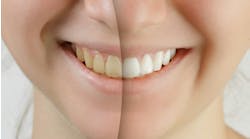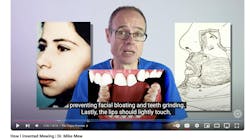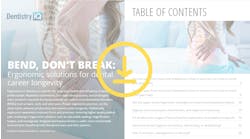In the United States, there are approximately 17.3 million adults—nearly 7% of the population—who experience depression.1 I often see patients arrive to their appointments overworked, exhausted, and speaking negatively about their experiences. With these emotions and feelings, it’s challenging for patients to improve on their home care and own their own diseases.
While researching depression, I found a podcast from author and researcher Shawn Achor that discusses how stress and negative thinking are transmitted throughout our environments. He recommended looking at four aspects of our daily lives to promote positive thinking and decrease stress and anxiety. Interestingly, this approach can help both ourselves and our patients.
Limit social media
With the rise of social media, it is easy to look at someone else’s highlight reel and compare it to our unfiltered life. Achor recommends limiting social media use to no more than 30 minutes a day. Providing a limitation on social media will reduce the ability of the content to negatively affect the environment around you.
Practice gratitude
Clinical studies show that listing three things that you are grateful for daily reduces negative thinking. I have personally done this for 90 days and feel an amazing difference in the outlook of my day. Studies conducted by Achor found that when patients with severe MS journaled about positive experiences for two minutes a day for six weeks, six months later doctors could drop the pain medication of the patient by half.2
Exercise
Physical activity changes the parts in the brain that regulate stress and anxiety. Engaging in exercise three times weekly has shown to increase the brain sensitivity to the hormones serotonin and norepinephrine, which relieve feelings of depression. Exercise also increases energy levels throughout the day.
Social connection
In a world where we are so connected virtually, we are more disconnected than ever. Having trusted friends who you can experience the ups and downs of life with is extremely important to your mental health. There are often social gatherings among local communities. Organizations such as Meetup promote free and low-cost events that are often centered around one's hobbies, such cycling or painting.
As dental hygienists, we play essential roles in the identification of diseases. This is not limited to oral diseases—therefore it is critical that we refer patients as needed. Creating an office that is filled with team members who are caring for themselves both emotionally and physically will positively impact the patient population. Happiness can often be a choice that positively affects those around us!
References
- National Institute of Mental Health. Mental Health Statistics. Available at https://www.nimh.nih.gov/health/statistics/major-depression.shtml. Accessed May 30, 2019.
- Achor S. The Life-Altering Power of a Positive Mind. (2019). https://podcasts.apple.com/us/podcast/shawn-achor-the-life-altering-power-of-a-positive-mind/id1264843400?i=1000434573471.
Amber Auger, RDH, MPH, is a practicing dental hygienist and clinical innovations implementation specialist. With 14 years of experience in the dental industry, Auger works with practices to provide customized protocols, to refocus on the patient experience, and to utilize systemic approaches to periodontal therapy. She is a regular contributor to RDH magazine, a featured author for DentistryIQ, and host of #AskAmberRDH. Auger also provides preventive services abroad yearly and is always willing to have dental professionals join her team. She can be reached at [email protected].







